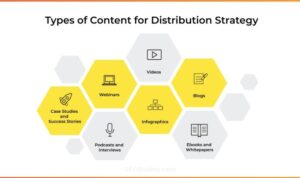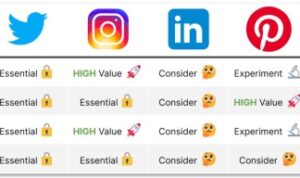Content Marketing Ideas kick off with a bang, diving into the realm of creativity and strategy to revolutionize your marketing game. From successful campaigns to engaging content creation, this guide has it all.
Unleash the power of innovative ideas and distribution channels to elevate your brand and captivate your audience like never before.
Overview of Content Marketing Ideas
Content marketing is all about creating and sharing valuable, relevant content to attract and engage a target audience. It focuses on building relationships with customers by providing them with useful information rather than just promoting products or services.
Successful Content Marketing Campaigns
Some examples of successful content marketing campaigns include:
- The “Share a Coke” campaign by Coca-Cola, where they personalized their bottles with people’s names, creating a sense of connection and encouraging customers to share their experiences on social media.
- The “Dove Real Beauty Sketches” campaign, which focused on self-esteem and body image issues, resonating with their target audience and sparking conversations about beauty standards.
- The “Red Bull Stratos” campaign, where Felix Baumgartner jumped from the edge of space, showcasing extreme sports and pushing the limits of human potential while aligning with Red Bull’s brand image.
Importance of Creativity in Content Marketing Strategies
Creativity plays a crucial role in content marketing strategies as it helps brands stand out in a crowded digital landscape. Creative content can capture the audience’s attention, evoke emotions, and drive engagement. It allows brands to differentiate themselves from competitors and create memorable experiences for their customers. By thinking outside the box and coming up with innovative ideas, brands can build a strong connection with their audience and drive successful campaigns.
Types of Content for Marketing

When it comes to marketing, using different types of content can help you reach your target audience in various ways. Each content type has its own significance in a marketing strategy, catering to different preferences and behaviors of consumers. Here are some key types of content that you can consider for your marketing efforts:
Blog Posts
Blog posts are a popular form of content marketing that allows you to share valuable information, insights, and updates with your audience. They are great for building brand authority, driving traffic to your website, and improving rankings.
Videos
Videos are highly engaging and can convey complex messages in a visually appealing way. They are perfect for showcasing products, telling stories, and connecting with your audience on a more personal level. Videos can be shared across different platforms, increasing your reach and engagement.
Infographics
Infographics are visual representations of information or data that are easy to digest and share. They are great for presenting statistics, trends, or processes in a visually appealing format. Infographics can help simplify complex concepts and attract the attention of your audience on social media platforms.
Podcasts
Podcasts are audio content that can be a great way to engage with your audience on-the-go. They are perfect for sharing industry insights, interviews, or discussions in a convenient format. Podcasts can help you build a loyal audience and establish thought leadership in your niche.
Content Creation Strategies
When it comes to creating killer content, you gotta have some solid strategies in place. From generating ideas to repurposing existing content, here’s how you can level up your content game.
Generating Engaging Content Ideas
- Brainstorming sessions with your team can spark some fresh ideas.
- Conduct audience research to understand what your target market is looking for.
- Utilize tools like Google Trends and BuzzSumo to identify trending topics.
Repurposing Existing Content
- Turn blog posts into infographics or videos to reach a wider audience.
- Create a series of social media posts based on a long-form content piece.
- Update and refresh old content with new information to keep it relevant.
The Importance of Storytelling
- Storytelling helps to humanize your brand and create emotional connections with your audience.
- Use real-life examples and anecdotes to make your content more relatable.
- Craft a compelling narrative that draws readers in and keeps them engaged till the end.
Content Distribution Channels

To ensure your content reaches the right audience, you need to distribute it effectively across various platforms. Here are some key distribution channels to consider:
Social Media Platforms
- Utilize platforms like Facebook, Instagram, Twitter, and LinkedIn to reach a wide audience.
- Optimize your content for each platform by tailoring the format and messaging to fit the audience’s preferences.
- Engage with your followers by responding to comments and messages promptly.
Email Newsletters
- Send out regular newsletters to keep your audience informed about new content and updates.
- Personalize your newsletters to make them more engaging and relevant to each subscriber.
- Include compelling visuals and clear calls to action to drive traffic back to your website.
and Organic Search
- Optimize your content for search engines to improve visibility and attract organic traffic.
- Use relevant s, meta tags, and high-quality backlinks to boost your search rankings.
- Create valuable, informative content that addresses common search queries in your industry.
Measuring Content Marketing Success
When it comes to content marketing, tracking success is crucial to understanding what works and what doesn’t. By measuring key metrics and analyzing data, businesses can optimize their strategies for better results.
Key Metrics to Track, Content Marketing Ideas
- Website Traffic: Monitoring the number of visitors to your site can indicate the effectiveness of your content in driving traffic.
- Engagement Metrics: Tracking metrics like time spent on page, bounce rate, and social shares can show how engaging your content is.
- Conversion Rates: Keeping an eye on conversion rates can help determine how well your content is converting leads into customers.
- ROI: Calculating the return on investment from your content marketing efforts is essential for measuring overall success.
Importance of Analytics in Evaluating ROI
Analytics play a crucial role in evaluating the return on investment (ROI) of content marketing. By analyzing data and metrics, businesses can determine the impact of their content on revenue generation and customer acquisition. This data-driven approach helps in making informed decisions and optimizing future strategies for better results.
Examples of Tools and Software
Google Analytics: A popular and free tool for tracking website traffic and user behavior.
HubSpot: A comprehensive marketing platform that offers analytics and reporting features for measuring content performance.
SEMrush: A tool that provides insights into , content performance, and social media metrics for measuring content marketing success.





